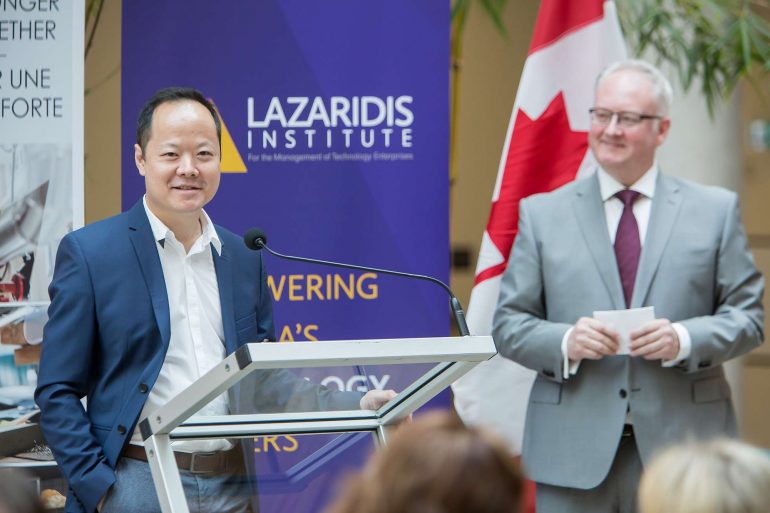Toronto-based Hockeystick is known for helping investors keep track of their portfolio companies’ data through a simple dashboard.
But now, Hockeystick is trying to magnify its vision of being an accurate and ubiquitous source of data not just for investors, but for the entire startup ecosystem. The company has received funding from Waterloo’s Lazaridis Institute to launch a national scale-up data platform for incubators, accelerators, and startups across Canada to share and research data. NEXT Canada, Volta, Propel ICT, Highline Beta, and OneEleven have already signed on to use the national scale-up data platform.
The Canadian government is supporting the platform, as FedDev Ontario provides funding of up to $2.5 million to the Lazaridis Institute for the national data scale-up platform, which is free for startups.
Thanks @hockeystickco for the live demo of your new innovative data platform to help #techentrepreneurs, (????and for the cool pen????️)! pic.twitter.com/GVg5EuBd8f
— Bardish Chagger (@BardishKW) April 27, 2017
“This will provide every startup organization, accelerator, and incubator in Canada with access to the full suite of Hockeystick tools, applicant management portfolio management, and data analytics for the next five years,” said Raymond Luk, founder and CEO of Hockeystick. “One thing about Hockeystick that’s different from Pitchbook is that there’s going to be a lot of funding data on Hockeystick that we already have, but we also have a lot of data that nobody’s ever had, like financial data about companies, nonfinancial metrics, and HR metrics. We’ve always let people decide what types of metrics they care about, and given them an easy way to go collect it.”
“This is stuff that people are talking about in research papers, but Canada is actually marching ahead and doing it.”
Luk said that a centralized hub streamlines the process for all players involved: startups can keep up-to-date on the latest funding opportunities and information on accelerators, incubators, and VCs, while investors can get updated on up-and-coming startups. Hockeystick can also anonymize and aggregate its data for comparisons, like how much the average company pays per square foot for an office in Toronto, or the average compensation for engineers in Calgary compared to Thunder Bay.
The data is self-reported, which gives startups an incentive to join the platform since they completely own it and can choose what to share. “They actually have a lot of interactions with other organizations, so their incentive to share their data is that they’re trying to raise money. They’re trying to get a loan. They’re trying to apply for a government program. They’re trying to apply for an accelerator, so they’re getting some value and they’re exchanging their data for that value,” Luk said.
While there’s a possibility that a startup could fudge their numbers, Luk said that makes it difficult when everyone is on the platform looking at your numbers, and you try to report something different when it comes time to pitch. “That same piece of data is going to be used when you’re applying for the Deloitte Fast 50, applying for your next round of funding, and it’s being reported to all of your investors.”

Hockeystick’s platform already has 12,000 companies, and The Lazaridis Institute is using this platform for its Scale-Up Program applicant management, data collection, and reporting. Bytown Consulting is being engaged by the Lazaridis Institute to create the logic and analysis framework for their Scale-Up Program, and guide what data is collected, which metrics are important, how the collected data are analysed into meaningful results, and how those results are tracked and reported over time.
“This national scale-up data platform is another example of the Waterloo Region’s values of innovation, community, training and sharing at work,” said Bardish Chagger, Minister of Small Business and Tourism. “In addition to creating over 150 jobs in our communities, the platform will help provide entrepreneurs across Canada with the tools they need to reach their full potential, become investment-ready, and compete on the global stage.”
With the government investment and capacity for the platform to provide detailed metrics to the government, Luk said that Canada is taking the lead on standardizing data collection compared to other countries. “That idea of bringing people together, standardizing metrics, and investing in the infrastructure to allow us to measure innovation. This is stuff that people are talking about in research papers, but Canada is actually marching ahead and doing it,” Luk said.


